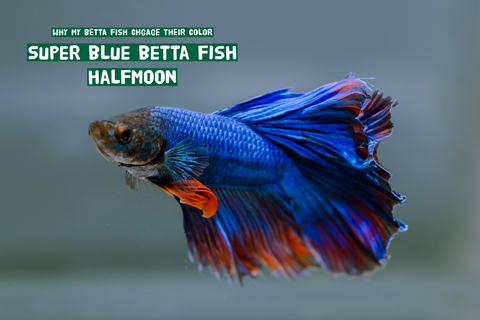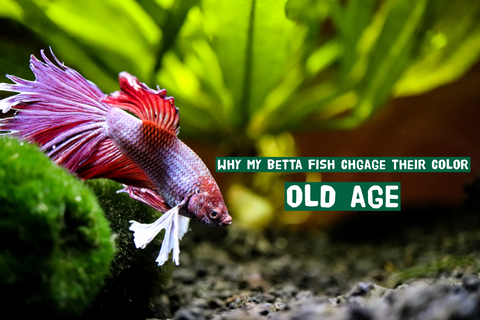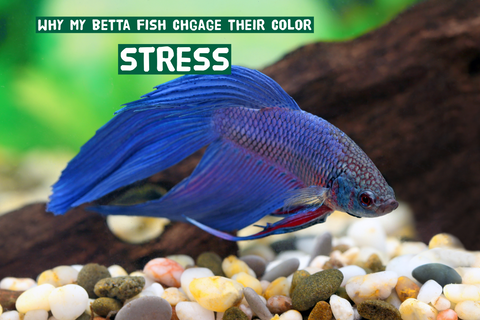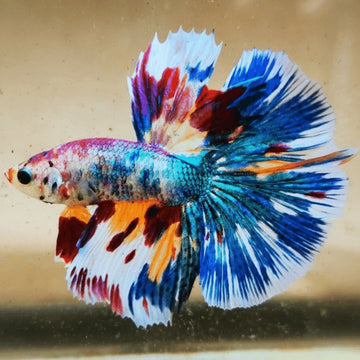That is exactly what happened with my beta fish, Primo, too! I wonder why the big change in color.
Why Do Betta Fish Change Color? The Secret Revealed!

Betta fish are capable of changing color
Hi there, welcome back to another article on betta fish. If you're new to the betta fish world, you've come to the right place. I've been keeping and breeding these beautiful creatures for over a decade, and I'm here to share some fascinating insights about one of the most interesting aspects of betta care: Their vibrant colors and how they can change over time. Whether it's a sudden shift or a gradual transformation, understanding why your betta's colors change can make a huge difference in how you care for them. So, let's dive in!

Basics of Betta Fish Colors
First off, let's talk about what makes bettas so colorful. It's all in their genes! Betta fish have a variety of genes that determine their coloration, from bold blues to radiant reds such as Koi, Nemo, Marble Genes. But it's not just genetics—pigments in their scales also play a big role. These pigments react to light and can make your betta's colors look more intense or fade, depending on their environment and health.
Environmental Factors and Diet
Believe it or not, where your betta lives and what they eat can affect their colors. A healthy diet and a clean, stress-free tank are like a magic formula for keeping those colors bright. I remember one of my bettas, Big Mac, who started showing dull colors. After I feed him with live blood worm twice per week for a whole month and improved his tank setup by adding dried Indian almond leaf to create tanning water, his blue hues became so vibrant, it was like watching a flower bloom!
Common Reasons for Color Changes
Age-Related Changes
Just like us, bettas go through changes as they age. Some colors may become more pronounced, while others fade. It's a natural part of their lifecycle, so don't be too alarmed if your older betta isn't as bright as they used to be. More than that, a betta can be more beautiful when they get older, such as Koi Red Betta, which the red tends to be darker.

Stress
Stress is a big color changer in the betta world. Poor water quality, high ammonia, unsuitable tank mates, or a diet that's lacking can all lead to faded or dull colors. I've seen bettas go from dull to dazzling once the stressors were removed. It's amazing how resilient they can be!

Health Issues
Sometimes, a change in color can be a sign that your betta is not feeling well. Diseases or parasites can cause colors to fade, such as fin rot, dropsy,... If you notice any rapid changes, it's important to check for other symptoms and consult with a vet if needed. Early detection can save your betta's life and color.

Water Conditions
The condition of the water in your tank can also affect your betta's colors. The right balance of pH, temperature, and hardness is crucial. I once had a betta whose colors became much more vibrant after I adjusted the water temperature by just a few degrees.

Positive Color Changes
Not all color changes are bad news. In fact, sometimes they can indicate that your betta is thriving! Improved care, better diet, and a more suitable environment can lead to positive changes in coloration. It's a rewarding experience to see your betta's colors brighten as a result of your care.
How to Maintain and Enhance Betta Fish Colors
Proper Diet
Feeding your betta a balanced diet is key to maintaining their colors. Foods rich in carotenoids and omega-3 fatty acids can really make their colors pop, such as brine shrimp, bloodworm,... Think about incorporating live foods, high-quality pellets, and frozen treats into their diet. Variety is the spice of life, after all!
Optimal Tank Conditions
Creating the ideal home for your betta is crucial. A clean, well-filtered tank with plenty of space to swim and a bunch of live aquatic plants to explore can do wonders for their well-being and coloration. Remember, a happy betta is a colorful betta.
Regular Care and Monitoring
Keeping an eye on your betta and their living conditions is essential. Regular water changes, tank cleanings, and health checks can prevent stress and illness, keeping those colors vibrant. It's all about creating a stable, healthy environment for your betta to thrive in.

Conclusion
Understanding why your betta fish changes color involves a mix of science, observation, and care. Whether you're dealing with natural changes, stress, health issues, or the effects of their environment, knowing what to look for can make all the difference. And remember, witnessing a positive color change in your betta can be one of the most rewarding experiences as a keeper. It's a sign that you're providing great care and that your betta is happy and healthy.
Taking care of betta fish is an incredible journey filled with learning and growth—for both you and your fish. The transformation in color is just one of the many aspects that make betta keeping so fascinating. So, keep observing, keep learning, and most importantly, keep enjoying the beautiful world of betta fish. Your dedication and love for these little creatures will not only brighten their colors but also enrich your life in unexpected ways.
Where to Buy Happy & Healthy Betta Fish Online
Discover your perfect betta fish at Tropicflow, your ultimate source for vibrant and healthy bettas, including an extensive selection of female betta fish. With a reputation for quality and care, Tropicflow ensures every fish is meticulously bred and nurtured. Explore their wide collection today and add a stunning new addition to your aquarium, all with the convenience of online shopping.
When I bought my beta fish about 2 months ago, Jasper was a marbled orange and white Plakat. Now, he/she has turned a very dark blue with a dark red/purple fins and tail. I have a planted tank and the water tests just perfect(I test once a week). It took me weeks to prepare his 6.6 gallon tank . He shows no sign of disease and swims happily around and comes to greet me when I stand at the tank. I even asked my husband if Jasper had died and he bought another fish to replace him! He is eating Omega One Betta Buffet Pellets. Why the BIG color change?











2 comments